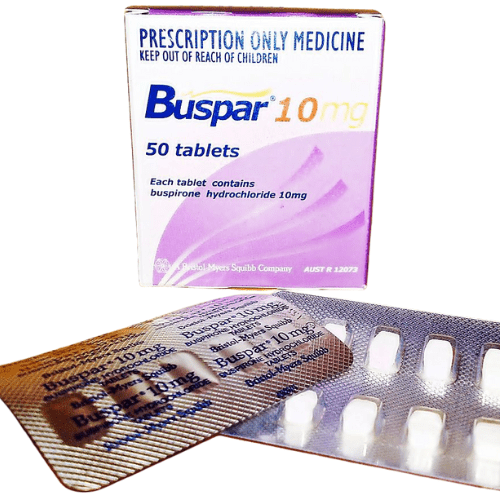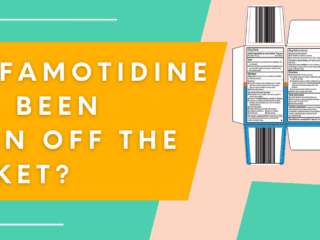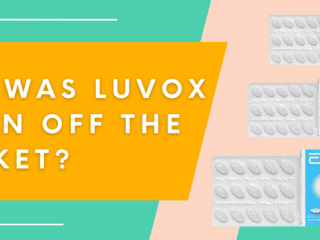If you’ve been suffering from an anxiety disorder, your mental health provider may prescribe medications like BuSpar to help manage symptoms. Despite all its popularity and efficacy considered, it was suddenly recalled. Why was BuSpar taken off the market?
What Is BuSpar?

Buspirone, previously available under the brand name BuSpar®, is one of several medications used to treat anxiety. Manufactured and distributed by the international pharmaceutical company Bristol-Myers Squibb, it was approved by the FDA in 1986 and is often prescribed as an alternative to conventional anxiety medications to help manage anxiety disorders or the short-term relief of anxiety symptoms.
The medication can help one think more clearly, relax, worry less, and participate in everyday life. It may also help one feel less jittery, lower temper and irritability, and relieve symptoms such as trouble sleeping, profuse sweating, and pounding heartbeats.
Like many other medications, buspirone wasn’t originally developed as a treatment for anxiety disorders. Instead, it was developed throughout the 1960s and 70s as a form of medication for psychosis. Although the company dropped the brand name BuSpar over a decade ago, it’s still widely used as a casual, unofficial name for generic buspirone.
The FDA approved BuSpar as a treatment for anxiety disorders and the short-term relief of anxiety symptoms. It’s also used off-label as an augmentation agent, a drug used together with another medication, to help treat certain forms of depression and mental health problems.
While it was proven to be an effective medication for anxiety symptoms, BuSpar wasn’t normally used as a first-line treatment. Instead, it was often used when other anxiety medications, such as selective serotonin reuptake inhibitors (SSRIs) or benzodiazepines, weren’t effective or caused severe or persistent adverse effects.
In some cases, buspirone is prescribed simultaneously as an SSRI to treat sexual side effects associated with antidepressants.
Why Was BuSpar Pulled From The Market?
For all of its popularity and efficacy, the removal of BuSpar from the market shocked many of its users. While the reasons are still unclear, the FDA confirmed that it was not removed for safety, formulation, or efficacy problems and was most likely due to the expiration of its patent in 2001. Eventually, in 2012, the brand was completely discontinued.
Another plausible reason for BuSpar’s discontinuation is that generic versions of buspirone became more widely available, as with other drugs and medications. To top it off, Bristol-Myers Squibb, the pharmaceutical company that manufactured and marketed BuSpar, didn’t take it off the market for safety or effectiveness reasons either.
However, the FDA still allows the use and sale of generic buspirone, which is still considered safe and effective when taken according to the doctor’s directions.
Health Benefits Of Buspirone
Buspirone belongs to a class of medications known as azapirones. While its exact mechanism of action is unknown, experts believe it has a strong affinity for serotonin receptors throughout the body.
Serotonin, a neurotransmitter â is a naturally-occurring chemical that delivers messages between neurons and other cells and is responsible for regulating moods, arousal, and feelings of happiness and anxiety. Low serotonin levels are associated with several psychiatric disorders, including depression and anxiety.
One study found that buspirone can increase serotonin levels and activity in parts of the brain related to fear and anxiety, such as the amygdala and some prefrontal regions. Experts also found that it proved more effective as an anxiolytic drug than an antipsychotic, and its limited side effect profile made it a popular alternative to other medications for anxiety.
Treating Generalized Anxiety Disorder
When treating generalized anxiety disorder (GAD), healthcare providers initially prescribe SSRI and SNRI antidepressants because they work well for a wide range of anxiety disorders and have been well-studied. However, in some cases, results aren’t as apparent or expected, so an additional prescribed dosage of medications like buspirone can yield better effects.
A study found that roughly more patients saw better results when they added buspirone to their existing SSRI antidepressant medication rather than taking the SSRI alone. On the other hand, another study found that adding buspirone did not yield more apparent, significant results.
Studies reveal that buspirone is generally effective as a treatment for anxiety disorders. One research published in the Journal of Clinical Psychiatry involved a buspirone treatment that lasted six weeks and found that people with GAD who took buspirone showed improvement in the symptoms of both anxiety and depression.
And compared to most anti-anxiety medications, buspirone does not work like a muscle relaxant and does not cause major sedative effects. It has also been observed to cause milder side effects and lower withdrawal symptoms risk.
How to Use Buspirone
Standard Dosage
Buspirone is available as an oral tablet. It comes in several doses, including 5 mg, 7.5 mg, 10 mg, 15 mg, and 30 mg per tablet. The recommended starting dose of buspirone for GAD patients is usually 15 mg daily (either in the form of two 7.5 mg or three 5 mg tablets), while the maximum daily dose of buspirone is 60 mg.
Your healthcare provider may eventually allow you to gradually increase your buspirone dosage until the ideal dose is achieved. Although buspirone is not associated with physical dependence or withdrawal symptoms, don’t adjust your dose or abruptly stop using buspirone without your healthcare provider’s direction.
Frequency
Take this medication by mouth, usually 2 or 3 times a day or as directed by your doctor. You may take this medication with or without food, but it is important to be consistent and always take it the same way to facilitate better absorption.
Many people find it helpful to take buspirone with food because it helps them remember to take it. Plus, taking buspirone with food can help ease nausea, a common side effect of the medication.
After taking a dose, avoid driving, using heavy machinery, or doing anything that needs alertness until you can do them safely to avoid accidents.
Interactions
Buspirone can potentially interact with other medications, including some existing prescription medications for depression and anxiety. Before using buspirone, tell your healthcare provider about all medications and supplements you currently use or have recently used.
Here are some of the most noteworthy medications that can interact with buspirone:
- Antihistamines – Taking antihistamines like Benadryl with buspirone may increase side effects such as dizziness, drowsiness, confusion, and concentration problems. Some people, especially the elderly, may also experience impaired thinking, judgment, and motor coordination.
- Anti-seizure medications – Certain anti-seizure medications like phenytoin (Dilantin), carbamazepine (Tegretol), lamictal, and phenobarbital can significantly inhibit the effects of buspirone in the body.
- Antibiotics– Antibiotics like erythromycin can raise buspirone levels in the body when taken orally. When buspirone levels are high in the body, the risk of experiencing side effects increases; your doctor may change your buspirone dosage if you take it with one of these drugs.
- Monoamine oxidase inhibitors (MAOIs) – These medications pose the highest risk of interaction with buspirone. Both medications can dramatically raise serotonin levels, which can cause serotonin syndrome and hypertension (high blood pressure). To prevent a potential interaction, MAOIs should be stopped at least 14 days before starting buspirone and vice versa.
- Other antidepressant medications – Antidepressant medications like cymbalta, lexapro, prozac, and zoloft may raise your risk for serotonin syndrome, whose symptoms include confusion, hallucination, seizure, blood pressure changes, increased heart rate, excessive sweating, shivering or shaking, vision problems, and fevers.
Avoid drinking large amounts of grapefruit juice since it may also drastically spike levels of buspirone in the body and increase the risk of side effects.
Missed Doses
If you miss a dose, take it as soon as you remember. If it is near the time of the next dose, skip the missed dose. Take your next dose at a fixed time and avoid doubling the dose to catch up.
Storage
Store the product in a tightly closed container at room temperature below 86 degrees F (30 degrees C), away from light and moisture. Keep out of your children’s and pets’ reach.
Other Precautions
Avoid consuming alcohol while you use buspirone. Alcohol can worsen the sedative effects of many anxiety medications, including buspirone. Avoid drinking alcohol while using buspirone to treat anxiety or any other condition.
For pregnant women, avoid taking buspirone without your doctor’s permission. At the same time, there aren’t enough studies and trials to establish its effects on pregnant women and fetal development.
Before using this medication, tell your doctor or pharmacist your medical history, especially if you have kidney problems, liver problems, bipolar disorder (manic-depression), or parkinson’s disease.
If you want to stop using buspirone, talk to your healthcare provider. They may suggest adjusting your dosage or switching to a different type of anxiety medication.
How Long Does It Take Before Results Appear?
Like many anti-anxiety medications, buspirone doesn’t work right away. One needs to wait for two to four weeks before judging its effects. Buspirone takes up to four weeks to work properly as an anti-anxiety medication. It’s important to use buspirone consistently, even if you don’t notice immediate improvements, to yield better results.
Suppose you need help with anxiety symptoms in the meantime. In that case, your healthcare provider may prescribe benzodiazepine (Ativan or Xanax) or hydroxyzine (Atarax or Vistaril) to relieve anxiety symptoms immediately.
Does Buspirone Cause Side Effects?
Although buspirone is often viewed as less likely to cause side effects than other medications for anxiety, it can still cause occasional ones but are often mild.
Dizziness is the most common side effect attributed to buspirone and could be more intense when you first start medicating with it. Likewise, it can feel stronger when Increasing the dose.
Other more common side effects of buspirone are:
- Drowsiness
- Headaches
- Lightheadedness
- Nausea
- Nervousness
- Trouble sleeping
Although rare, serotonin syndrome can also occur when buspirone is combined with other antidepressants. Seek immediate medical attention if you experience any of the following:
- Agitation or restlessness
- Insomnia
- Irritability
- Confusion
- Concentration problems
- Rapid heart rate
- Chest pains
- Dilated pupils
- Vision problems
- Loss of muscle coordination
- High blood pressure
- Twitching muscles
- Muscle rigidity
- High body temperatures
Compared to more popular anti-anxiety medications like Xanax, buspirone doesn’t cause severe withdrawal symptoms.
Talk to your provider if you experience any uncomfortable side effects with buspirone. They will help you decide whether to continue or switch to a different treatment option.
In some cases, buspirone can cause elevated levels of liver enzymes. It’s important to contact your healthcare provider if you experience any severe or persistent adverse effects while you’re using buspirone.
Takeaway
While it’s no longer available as BuSpar, buspirone is still widely used to treat issues such as generalized anxiety disorder, especially when other medications cause side effects or aren’t fully effective.
If you think you could have an anxiety disorder, you can get expert help and find out more about your options by asking your primary care provider for mental health. When considering buspirone, disclose your medical conditions and the medications you take to prevent health risks and weigh better options.
Disclaimer: this article does not constitute or replace medical advice. If you have an emergency or a serious medical question, please contact a medical professional or call 911 immediately. To see our full medical disclaimer, visit our Terms of Use page.









